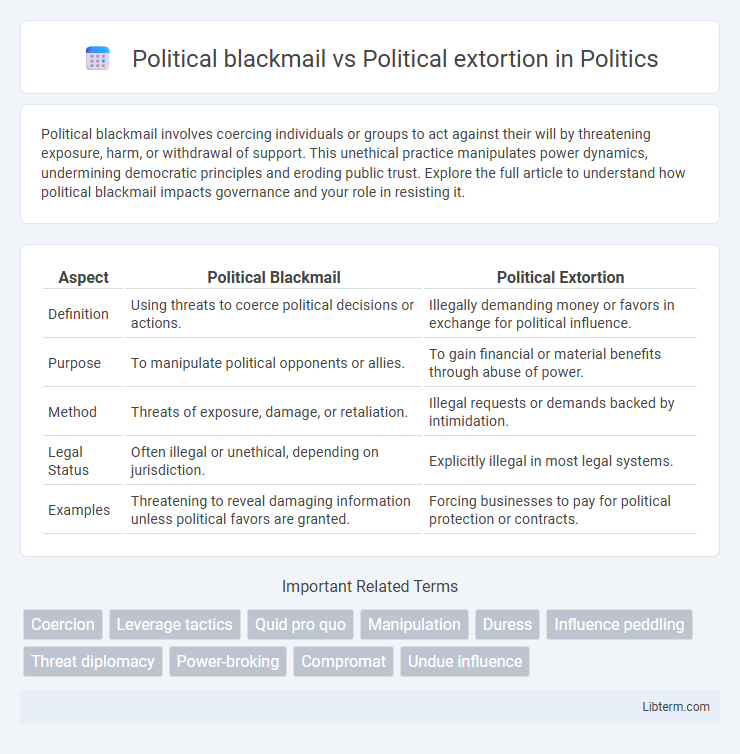Political blackmail involves coercing individuals or groups to act against their will by threatening exposure, harm, or withdrawal of support. This unethical practice manipulates power dynamics, undermining democratic principles and eroding public trust. Explore the full article to understand how political blackmail impacts governance and your role in resisting it.
Table of Comparison
| Aspect | Political Blackmail | Political Extortion |
|---|---|---|
| Definition | Using threats to coerce political decisions or actions. | Illegally demanding money or favors in exchange for political influence. |
| Purpose | To manipulate political opponents or allies. | To gain financial or material benefits through abuse of power. |
| Method | Threats of exposure, damage, or retaliation. | Illegal requests or demands backed by intimidation. |
| Legal Status | Often illegal or unethical, depending on jurisdiction. | Explicitly illegal in most legal systems. |
| Examples | Threatening to reveal damaging information unless political favors are granted. | Forcing businesses to pay for political protection or contracts. |
Defining Political Blackmail and Political Extortion
Political blackmail involves threatening to reveal damaging information about an individual or group unless specific demands are met, focusing on coercion through exposure. Political extortion, by contrast, entails the use of official power to demand money, favors, or influence under threat of harm or adverse consequences, emphasizing exploitation of authority. Both tactics undermine democratic processes but differ primarily in method--blackmail leverages secretive information, whereas extortion utilizes formal or informal power structures.
Core Differences Between Blackmail and Extortion in Politics
Political blackmail involves threatening to reveal damaging information about a political figure unless specific demands are met, leveraging personal or confidential data as the primary tool. Political extortion requires obtaining money, favors, or political power through coercion, often by exploiting an official's authority or using threats of physical harm or legal action. The core difference lies in blackmail focusing on covert threats tied to information exposure, while extortion involves overt threats to force the transfer of tangible benefits or influence.
Historical Examples of Political Blackmail
Historical examples of political blackmail include the use of kompromat in Soviet-era Russia, where political adversaries were threatened with the release of damaging personal information to control their actions. The Teapot Dome scandal in the 1920s United States also exhibits traits of political blackmail, involving government officials who used confidential information to coerce others in oil lease deals. These cases highlight how political blackmail has been employed as a tool to influence decisions and maintain power through intimidation and coercion.
Notorious Cases of Political Extortion
Notorious cases of political extortion often involve the use of threats or coercion to influence political decisions or gain leverage, as seen in the Watergate scandal where illegal activities aimed to manipulate electoral outcomes. Political extortion contrasts with political blackmail by its direct demand for tangible benefits such as money or policy changes. The widespread corruption scandal involving former Ukrainian officials exposed extensive extortion schemes leveraging political power for personal enrichment and foreign influence.
Legal Framework: Blackmail vs Extortion in Governance
Political blackmail involves coercing public officials through threats to disclose damaging information, relying on exploiting reputational harm within legal boundaries, whereas political extortion typically entails using force or illegal acts to obtain benefits or favors from government entities. The legal framework distinguishes blackmail as a crime of obtaining property or advantage through threats, often covered under statutes addressing coercion and intimidation, while extortion includes broader forms of illegal compulsion, frequently involving misuse of official power and accompanied sanctions under anti-corruption laws. Enforcement agencies scrutinize these offenses differently, with blackmail emphasizing proof of threat-induced consent withdrawal and extortion focusing on abuse of authority and tangible losses or gains within governance systems.
Motivations Behind Political Blackmail and Extortion
Political blackmail typically stems from a desire to manipulate power dynamics or coerce specific actions by threatening the exposure of damaging information, often motivated by personal or political gain. Political extortion involves extracting tangible benefits, such as money or favors, through threats or coercion, driven largely by material gain or influence. Both practices undermine democratic processes but differ in underlying motivations: blackmail seeks to control behavior via fear, while extortion aims for concrete rewards.
Impact on Democratic Institutions and Public Trust
Political blackmail undermines democratic institutions by coercing officials to act against public interest, eroding transparency and accountability. Political extortion destabilizes governance through threats or coercive demands, which breed corruption and weaken institutional integrity. Both practices significantly diminish public trust, fostering cynicism and disengagement from the democratic process.
Techniques Used in Political Blackmail and Extortion
Political blackmail involves coercive techniques such as threats to reveal damaging personal or professional information unless specific political demands are met, often leveraging confidentiality breaches or surveillance data. Political extortion employs more direct and forceful strategies, including leveraging positions of power to demand money, favors, or influence under the guise of legal authority or administrative control. Both tactics rely heavily on exploitation of sensitive information and manipulation of power dynamics within political structures to achieve compliance.
Preventive Measures and Policy Recommendations
Political blackmail involves threats to reveal sensitive information to coerce political actions, while political extortion uses force or threats for illicit gain. Preventive measures include transparent governance, robust whistleblower protection laws, and stringent monitoring of political financing. Policy recommendations emphasize mandatory disclosure of political interactions, independent anti-corruption bodies, and civic education to strengthen accountability and public trust.
The Future of Political Ethics: Combating Abuse of Power
Political blackmail involves leveraging threats to reveal damaging information to influence a decision, whereas political extortion uses coercion to obtain benefits or favors. The future of political ethics demands stringent transparency measures and robust legal frameworks to detect and deter such abuses of power. Emphasizing accountability through independent oversight bodies can significantly reduce the prevalence of these unethical practices.
Political blackmail Infographic

 libterm.com
libterm.com